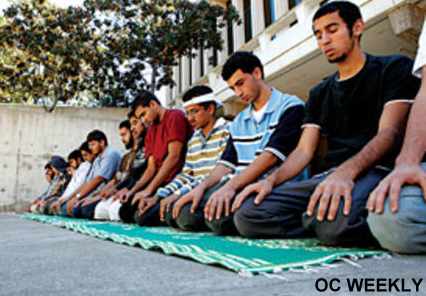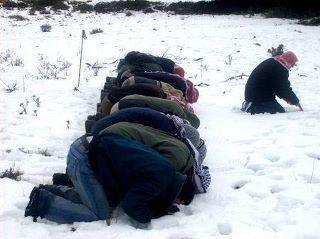PRAYING BY THE RULES

by
DAVID SOLWAY
______________________________
David
Solway is a Canadian poet and essayist (Random Walks)
and author of The Big Lie: On Terror, Antisemitism, and
Identity and Hear,
O Israel! (Mantua Books). His editorials appear
regularly in frontpagemag.com and
PJ Media. His monograph, Global Warning:
The Trials of an Unsettled Science (Freedom Press Canada)
was launched at the National Archives in Ottawa in September,
2012. His latest book of poetry, Habibi:
The Diwam of Alim Maghrebi
(Guernica Editions), is now available as is his most recent
collection of essays, The
Boxthorn Tree. And a song from David's soon
to be released CD.
I learned
recently that Carleton University in the nation’s capital,
Ottawa, following in the footsteps of other Canadian universities,
has set aside a designated and enlarged prayer space, intended
mainly for Muslim students who, as the Ottawa Citizen
reports, “pray five times a day and for years have suggested
that they need more room.” Otherwise, as president of
the Muslim  Student
Association Mohamed Abdalla informs us, students end up praying
in stairwells or libraries. That would clog up the works p.d.q.,
especially when convened five times a day.
Student
Association Mohamed Abdalla informs us, students end up praying
in stairwells or libraries. That would clog up the works p.d.q.,
especially when convened five times a day.
Such
accommodation, however, has no place in the public mandate of
the academy’s parietal affairs, and Muslim students who
proceed to foreground their faith in this disruptive manner
should perhaps consider attending a Muslim university, or no
university at all. The easing of the prayer crunch by constructing
or expanding a designated venue, accepted by the author of the
Citizen puff job as a prudent expedient, should not
disguise the fact that public prayer (and in particular numerous
prayer sessions punctuating the scholarly habitat) has no place
in the Western university whatsoever.
I do
not believe that Muslim students need more room. I believe that
they need less mollycoddling and fewer concessions made in the
name of their religious convictions. The university is a secular
institution operating under an implicit code of academic conduct,
which stipulates, inter alia, that classes be attended,
that academic work proceed under rules of normative and respectable
behavior, that examinations be held and properly invigilated,
that modes of dress not be offensive, and that religious observances
not interfere with a course of study.  Allowing
students to march five times a day to a prayer room in the midst
of pursuing a concentrated program of academic activity, whether
in the middle of a class or in the middle of a test or in the
middle of a joint research project, does not seem an optimum
means of following a university curriculum.
Allowing
students to march five times a day to a prayer room in the midst
of pursuing a concentrated program of academic activity, whether
in the middle of a class or in the middle of a test or in the
middle of a joint research project, does not seem an optimum
means of following a university curriculum.
Of
course, one need not stop at prayer rooms. Recently, the University
of Regina has accommodated its Muslim students by installing
specialized sinks for pre-prayer washing of feet, at the cost
of $35,000. The entire tone of the Saskatchewan News
article reporting on this glorious event is complaisantly favorable;
after all, as journalist Aaron Stuckel educates us, “All
Muslims have to purify themselves before they can pray to their
god, Allah”—and the temporal Western university
is, on this view, just the right place for foot baths to assist
a sacralised washing ritual at multiple intervals during the
academic day.
A controversy
has recently erupted over a species of abject propitiation at
York University that illustrated the academy’s dilemma
over competing rights. A male student, whose name is being withheld,
had asked to be excused from attending a class where female
students form the majority, because the presence of women interfered,
as Martin Singer, dean of the Faculty of Liberal Arts and Professional
Studies deposed, with his “firm religious values.”
The professor in question, J. Paul Grayson of the Department
of Sociology, rejected his request on the principle of gender
equity. The administration, however, sided with the student
and admonished the professor for refusing to “accommodate”
the defector, on the principle of religious freedom. Singer
afterward glossed the episode by declaring he was bound by the
Ontario Human Rights Code, a fancy title for the sanctimonious
folly of cultural, ethnic and religious appeasement that is
denaturing the province and the country.